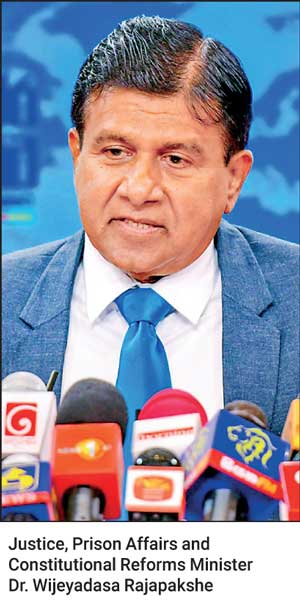Saturday Feb 21, 2026
Saturday Feb 21, 2026
Tuesday, 26 March 2024 02:18 - - {{hitsCtrl.values.hits}}
 Justice, Prison Affairs and Constitutional Reforms Minister Dr. Wijeyadasa Rajapakshe has reassured the public that the election amendment bills presented to Parliament are not expected to lead to any postponement of elections.
Justice, Prison Affairs and Constitutional Reforms Minister Dr. Wijeyadasa Rajapakshe has reassured the public that the election amendment bills presented to Parliament are not expected to lead to any postponement of elections.
Addressing journalists at the Presidential Media Centre, the Minister highlighted the Government’s commitment to combat corruption and reform the electoral system.
He noted that President Ranil Wickremesinghe has already submitted amendments aimed at tackling corruption and implementing a proportional election system.
Addressing speculation about the possibility of election postponement due to the ongoing electoral amendments, the Minister clarified that none of these amendments are intended to delay elections.
He encouraged candidates participating in upcoming elections to engage in discussions on the proposed amendments, providing an opportunity for public input in shaping election processes.
“I would like to highlight that along with other developments, an election amendment bill has recently been submitted to Parliament,” he added.
The Minister explained the importance of informing the public about the proposed laws in Parliament, particularly regarding amendments to the country’s legal framework. One significant amendment mentioned was the expansion of the definition of rape to encompass all genders, ensuring that victims of sexual violence receive adequate legal protection. Additionally, the proposed amendments aim to strengthen penalties for coercion in various settings, such as police custody and prisons. Notably, there is a provision for a 10-year prison sentence for minors involved in corruption, reflecting the Government’s efforts to address systemic issues.
He acknowledged concerns and objections from social activists regarding these amendments, whilst highlighting the extensive research conducted by a team of senior lawyers over four years to inform these legal changes.
Regarding electoral reforms, Dr. Rajapakshe recalled historical promises made by presidential candidates since 1994 to address corruption and reform the electoral system. Despite various amendments to the constitution, no significant changes have been made to the electoral system thus far.
“The 19th Constitutional Amendment marked a significant shift in Presidential powers, particularly in removing Presidential immunity from prosecution. This amendment has led to increased legal accountability for presidential actions, with several former presidents facing legal challenges,” he pointed out.
Dr. Rajapakshe also proposed the introduction of a senate system to enhance representation in the electoral process, citing examples from countries like India, the UK and the US. He stressed the importance of diverse representation in Parliament to reflect the varied expertise and perspectives of the population.